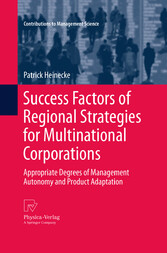Suchen und Finden

Success Factors of Regional Strategies for Multinational Corporations - Appropriate Degrees of Management Autonomy and Product Adaptation
Mehr zum Inhalt

Success Factors of Regional Strategies for Multinational Corporations - Appropriate Degrees of Management Autonomy and Product Adaptation
This work examines the factors that drive the success of Multinational Corporations (MNCs) in their pursuit of regional strategies. The author develops a comprehensive regional success factor model, by which the effects of regional management autonomy and regional product and service adaptation on the regional success of MNCs as well as the interaction effects of regional orientation and inter-regional distance are investigated. The model is evaluated by means of the partial-least-squares (PLS) method on the basis of a survey-based inquiry of the Fortune Global 500 firms with success indicator data for a period of nine years. The findings highlight the importance of considering the different degrees of contextual influence in the design of regional strategies, where low degrees of regional management autonomy and high levels of regional product/service adaptation are found to be appropriate for MNCs to be regionally successful.
Alle Preise verstehen sich inklusive der gesetzlichen MwSt.


















